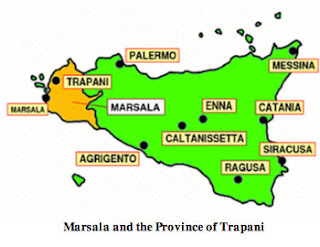Visit 6 Sicilian Wineries to Discover the True Marsala Wine - Camagna Country House
Visiting Sicily and More....
Camagna Country House
A sea storm forced John Woodhouse to seek shelter in the port of Marsala in 1773. The Englishman, son of a tradesman from Liverpool, had arrived in the island to buy soda, which was then - along with coral and tuna fish - the most exported product from Trapani region.
He tasted the local Grillo wine in a small “trattoria”, and was charmed by its particular bouquet, very similar to the more expensive Sherry and Madeira, so popular among English navy officers who were his major buyers. In order to export this special wine to England, he added some alcohol to it so that it could survive the long sea voyage. English customers gave this newly invented wine a great welcome. They appreciated it as a rival of both the Spanish and Portuguese wines in the European market.
Marsala resisted the sea journey to England and became part of the normal supplies for the Royal Navy. In 1800 Admiral Nelson signed a written order for a supply of 500 gallon barrels in favour of the British Navy monitoring the Mediterranean Sea during Napoleonic Wars. Woodhouse was followed by a large number of English tradesmen, as for example Benjamin Ingham and his grandchildren (among them Joseph Whitaker is worth mentioning), who set up their wineries in Marsala. They enhanced the winemaking techniques and bought several renowned Bagli along the coast, restoring them for their wine production.
Once upon a time… the Marsala wine. To be honest, it still keeps on being produced, sold and drunk, but its current reputation is not as shiny as it was in the past. There was a time when Marsala - the Sicilian town - was well renowned all over the world for its wine. Its fortune begun when, according to legend, an English merchant, John Woodhouse, accidentally ended up in Marsala in 1770 where he fell in love with the local “tanned wine” produced by the farmers, called Perpetuum, (from the Latin, ‘perpetual’). The taste of that wine was quite like some successful fortified Spanish and Portuguese products, so popular in England at that time; in fact, to make their wine the Marsala farmers used a process called in perpetuum, which is like the soleras system used to produce Sherry in Jerez de La Frontera (Spain). Woodhouse realised that it would be a successful wine, and decided to import it, but to preserve it during the shipping on the sea, ordered that brandy be added to it… And indeed the Marsala had a huge success, that went on for many decades. Sadly though, during the 1900s, its market begun to lose its force; many producers went bankrupt or were bought by other companies. Besides, to maintain high sales the quality of the product was lowered with fancy products (“egg Marsala”), that nowadays you can find in any supermarket at the cost of a few Euros. In recent years a few producers have started to offer high quality Marsala wines, so nowadays you can find wines that meet all the expectations. Here, we want to suggest some extraordinary wineries that you cannot miss, if really you want to know and taste the most authentic Marsala. Finally, a small suggestion: Marsala is more than a wine; it is an experience. You can pair it with food, salty or sweet, but the best match has no rules. Enjoy when you want and with whom you want!
The first winery you should visit once landed in Marsala, is Caruso e Minini, founded in 2002 by two families, the Sicilian Caruso (who owns 120 hectares of vineyards in the province of Trapani) and the Minini, from Lombardy, people with a strong experience in international markets. Together, the two families are running a successful winery that produces wines from local grapes (like Grillo, Catarratto, Nero d'Avola, Perricone among the others) and from some international grapes like Cabernet Sauvignon, Merlot or Syrah. The headquarter is in a “baglio” of XIX century in the traditional local architectural style: a large square courtyard surrounded by buildings where every phase of the winemaking process happens.
Marsala story is long-lasting and fascinating, but for somebody the wine is not easy to understand at first blush; so, the best thing you can do is grant yourself an educational tour in the Marsala world.
Baglio Baiata Alagna is pretty close to Caruso e Minini, and his owner, Ercole Alagna, is a professor, passionate and expert, who owns 50 hectares (123,55 acres) in the surrounding area where grapes like Zibibbo, Grillo, Catarratto and Damaschino are cultivated. In this winery, you’ll have the opportunity to do a tour in the history and in the winemaking of Marsala, as well as to taste some delicious typologies of the wine - which, like the Port wine, has more than one kind.
The third visit I suggest you plan is to a real specialist in fortified and sweet wines: Martinez. This family has been producing wines since 1886 and beyond their great Marsala and sweet wines for Pantelleria or aromatic wines, they are renowned for a quite unusual production of sacramental wines. They also have an app you can download (both for iOS and Android), to know some match of Marsala with the food and enjoying more the visit.
As I mentioned before, the Marsala wine like we know it nowadays is a relatively recent invention, because the authentic local wine of Marsala was the Perpetuum, and nobody currently produces it… but if you are curious to know what this wine tasted like, there is a chance: going to Baglio Donna Franca. Located not far from Marsala town, this is an amazing relais-restaurant-winery just in front of the sea and surrounded by vineyards; the view you can enjoy from the terrace at the sunset is remarkable. The owner, Giacomo Ansaldi, is truly an expert and lover of Perpetuum, as well as a researcher and a good wine producer himself, so in his winery you can taste his products and also that ancient wine.
At this point, though, you cannot leave Marsala without visiting “the legend” of Marsala wine: the Marco De Bartoli winery, now managed by his sons Renato, Sebastiano and Giuseppina. In an old building that somehow reminds an ancient Roman home surrounded by vineyards, in his cellar with very old and huge barrels, Renato De Bartoli produces many very well-known wines from autochthones grapes. The most surprising of them? Maybe the “Vecchio Samperi”: made with Grillo grapes 100% and the traditional “in perpetuum” method. A sip of liquid gold you’ll never forget
Phone +39.347.80.21.347 email: pltmanagement@libero.it










Commenti
Posta un commento